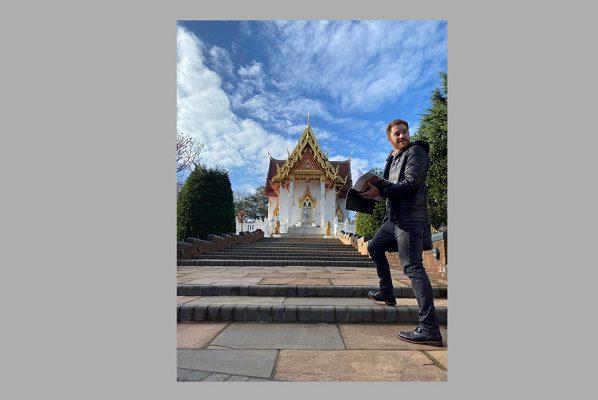Faculty Spotlight

“My research pulls in multiple directions, but it’s also all driven by a fascination with how religious people have thought about the wild and expansive possibilities of language and literature. My first book, which should be published next year (knock on wood), is about a sixteenth-century Sufi Muslim community in what is now Afghanistan who pursued the language of God. So much of what motivated and shaped that particular community was this notion that God’s language—even God’s very presence—could be brought into human language. Moreover, they explored the idea that the entirety of the world is language—God’s language—and so the mountains, the wind, the trees, and our own human bodies and our own human language are all just the spoken words of God. Their experiment with divine language, revelation, and messianic poetry had a foundational role in the development of Pashto literature, and I argue that these dalliances with Pashto revelation are also essential to understanding the political transformations of the time. What it means to be “Afghan,” to be under the rule of the emperor, to inhabit the mountainous frontier between two empires…all of this was profoundly shaped by Sufi experiments with divine language. I’m also working on two other projects. On the one hand, I’ve been gathering and analyzing ‘imitations of the Qur’an.’ A common doctrine in Islamic theology is that the Qur’an cannot be imitated. As we might expect, though, many poets, messiahs, polemicists, would-be prophets, and apocalyptic preachers took that theological doctrine as a dare to do exactly that: imitate the Qur’an. Even James Joyce’s Finnegans Wake might be considered a Qur’anic imitation in parts! I think these imitations give us a new angle on Muslim (and non-Muslim) engagements with the Qur’an and how expansive that might be. It’s way too common to assume that the Qur’an is a “book” or a scripture that can be compared to other books and scriptures. Sure, but it’s so much more! It’s the direct word of God for Muslims, it’s a model for Arabic literature, it’s sound, it’s resonance, it’s holy vibes and affective presence. All these Qur’anic imitations, no matter how heretical are in mainstream consideration, ask an important and common question: what makes the Qur’an the Qur’an? Why is it inimitable? What is the “recipe” for divine speech? Finally, I’m also working on a translation with an Iranian friend of mine. Ahoo Najafian and I are translating a book-length masnavi poem by Farid al-Din ‘Attar called the Musibat-Namah (which we translate as The Divine Tragedy). It’s an allegory about the troubles, tortures, and toils that a soul encounters when it pursues the spiritual path to God. Most of the poem consists of lengthy dialogues between a pilgrim and various representatives of Islamic cosmology. The pilgrim meets and questions angels and Satan as well as personifications of Heaven, Hell, Fate, Imagination, and so on. It’s wild stuff, and it’s also a brilliant reflection on how allegory works. Too often when thinking about ‘Attar and other Sufi poets, we still use concepts rooted in the European literary tradition (such as Dante’s notion of allegory, for instance), but here we have a poem where ‘Attar quite consciously walks us through what allegory is and why allegorical language is the key to all the secrets of the universe. You’ll have to read our translation to find those, though! As for the career choices, wow, that’s a tough one. I’m not sure I know why I’ve made the choices I’ve made, but I’m certainly overwhelmed with a sense of gratitude and joy to be here now. My Monday evenings are spent reading mystical literature and theories/critiques of religious experience with twenty brilliant students, and I wake up on Tuesday morning to then lead a conversation on the history of the Qur’an. Aside from the teaching, though, what really keeps me going is this strumming sense that there’s so much out there. I’ve been so fortunate to travel to Iran, Syria, Turkey, India, Pakistan, and elsewhere for my research, and I’m just overwhelmed by how much life, history, and culture is out there. I feel so vanishingly small at times, and yet that’s a wondrous sensation. Each new project, each new research trip, each new archive and manuscript…they’re all chances to have my world cracked open yet again and seen through some new perspective.”